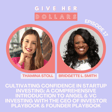
Pay Equity & Asking For A Raise: From Journalism to Closing the Gender Pay Gap with the Founder of PepTalkHer
Update: I recently launched my newsletter, The Sheconomist, and would love for you to subscribe: sheconomist.com - I share so many tools and resources that help young, high-achieving women with radical money and career self-advocacy.
----
In this episode, we sit down with Meggie Palmer, an influential founder, speaker, and journalist on a mission to close the gender pay gap through her platform, PepTalkHer. Originally from Australia, Meggie now calls New York City home, and she shares her incredible journey from her career in journalism to founding her first business.
Meggie's passion for supporting women in the workforce and promoting diversity is contagious. With PepTalkHer, Meggie and her team run corporate programming for brands including Salesforce, JP Morgan, and LinkedIn where they work in-house with companies to recruit, retain, and promote diverse talent.
Meggie shares personal anecdotes about the power of collective success, offering valuable advice on navigating challenges and societal pressures, particularly around money. She talks about the importance of pay transparency and offers advice on how to ask for a raise at work.



















